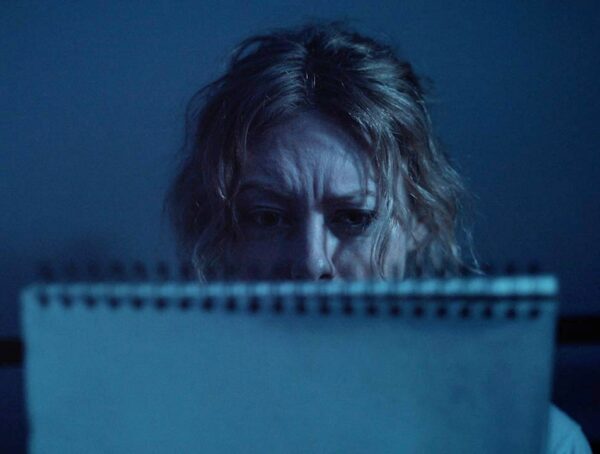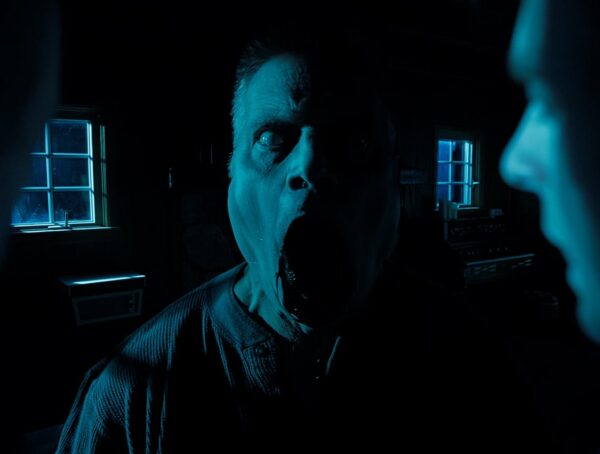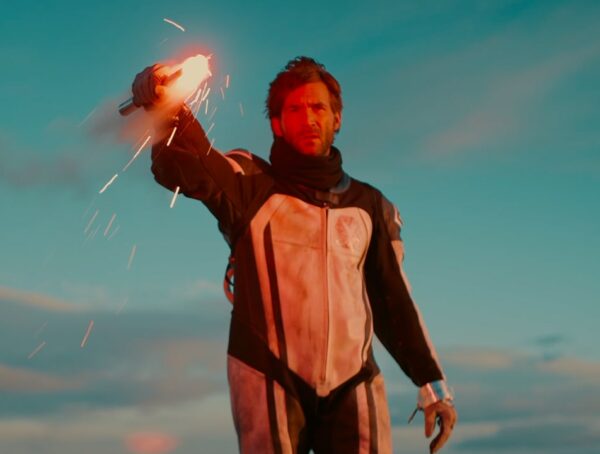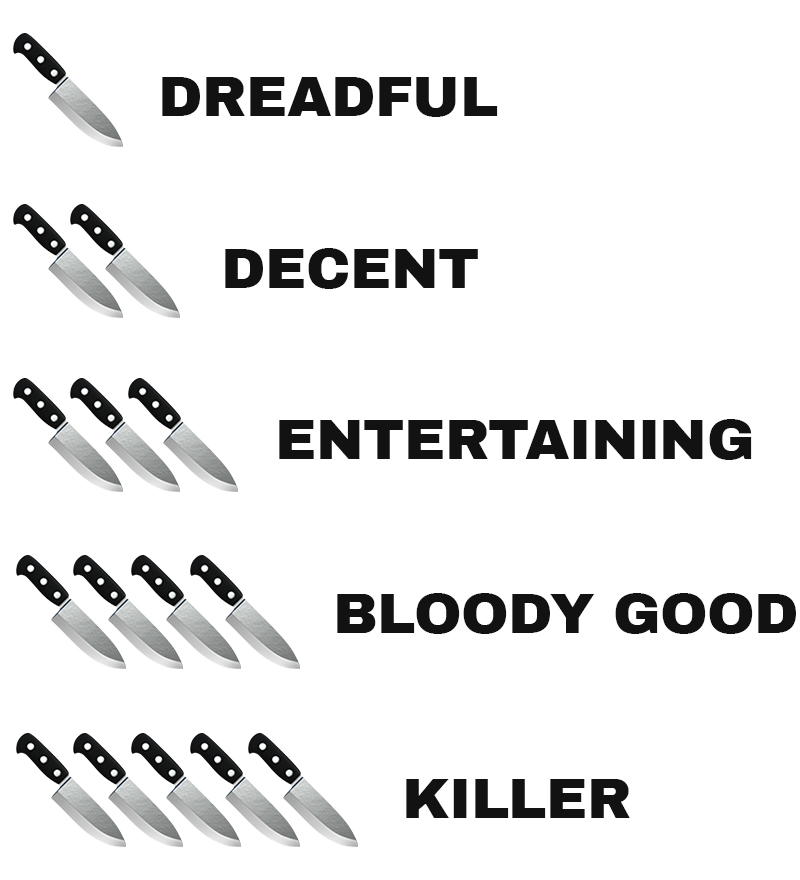Sponsored Feature: Resurgam Productions
Clandestine is an upcoming short exorcism film written and directed by Alexander Balzano.
Watch the pitch video here
Clandestine centers on Father Cal Hunter, the sole priest of a remote congregation in rural Maine. When tasked with investigating a reported possession of a young boy, matters become complicated when the demon reveals knowledge of his secret relationship with his boyfriend, Sean. Will Cal leave the boy at the mercy of this demon to safeguard his hard-earned happiness, or risk everything to save the boy?
Q&A with director Alexander Balzano
Hi Alexander! Thank you for joining us to discuss your upcoming horror film Clandestine. Tell us about how you came up with the concept for the film.
I’ve had the concept for Clandestine kicking around for a bit. I had originally envisioned it as a feature but wanted to tackle doing a short, minimalistic version of this focusing on the central creative elements. I’ve always been interested in the intersection of religion and sexuality as I was raised Catholic in a blue collar community but have also enjoyed a diverse friend group from different aspects of the LGBTQ+ spectrum. During my creative process, I enjoy combining various character traits to see what unique results I can generate. I was really drawn to this idea of a heroic exorcist battling demons who happens to be a gay man with a loving relationship. Being that everyone’s coming out journey (and who they decide to let in) is a very personal one, I felt that the conflict residing around a demon possessing knowledge of a priest’s hidden sexuality and boyfriend prompts naturally endearing stakes and presents a distinct moral dilemma, save the child or safeguard your secret? Around the time I was developing the concept for Clandestine, I became really engrossed in Frédéric Martel’s book: In the Closet of the Vatican, an investigative piece that, based on the testimonials of over a hundred church officials, showcases an overwhelming majority of priests and bishops serving in the Vatican, including several prelates, who have given anti-gay-sex speeches, are in fact gay themselves and either secretly sexually active or repress their desires. This book became the backbone of my research and the element of hypocritical judgement within organized religion resonated deeply with me as a result.

Clandestine touches on a variety of different themes. What themes are you hoping viewers will pick up on from watching the film?
There are a few distinct themes I hope to translate to viewers. Firstly is the theme of religious hypocrisy, especially pertaining to the Catholic Church. I aim to highlight the contradiction of its teachings of love and acceptance with the rejection faced by LGBTQ individuals within many religious communities. Secondly, is the shocking depth of inherited hatred prevalent in individuals and entire communities. Primarily this is evident in Kathleen, the blue collar mother of the possessed child, who immediately demonstrates her prejudice. Though not a justification, I want to illustrate how some communities contain such a deep-seeded, unbroken history of hatred and prejudice, that it is seemingly ingrained in their DNA and lacking the capability to change. Lastly, an especially pivotal takeaway is love as a driving force. Demonstrated by Father Cal and his boyfriend, Sean, the strength of the bond they share proves more powerful in battling the malevolent forces than Cal’s ingrained dogma.

The film takes place in Maine and I know you have plans to film there. Why did you decide on this location and why is it important to film there too?
It was important for me to have this Maine-set story filmed on location for a few reasons. I am myself a Maine local and grew up here so some of it is nostalgic and local pride. Maine as a location possesses a lot of untapped story potential considering its history, beautifully untouched landscape, and diversity, especially in the contrast of urban and rural environments which can change within a matter of a few miles here. Maine has also been known for its lack of initiative investing in State film incentives which unfortunately restricts a lot of major studios from bringing productions and set work to the film professionals here. Ironically, most films set in Maine are shot either in Massachusetts or British Columbia for this exact reason, so it was important for me to film this entirely in my home State.
Firstly is the theme of religious hypocrisy, especially pertaining to the Catholic Church. I aim to highlight the contradiction of its teachings of love and acceptance with the rejection faced by LGBTQ individuals within many religious communities.
We’re seeing a lot more LGBTQ representation in horror films lately and Clandestine will also focus on members of the community. Do you think this representation is more important now than ever?
LGBTQ representation in film & TV is especially pivotal now as ever for a variety of reasons. Authentic and positive representation is important for any demographic to help intended communities feel uplifted, represented, and empowered. Film and video are important tools for social justice. For any community seeing themselves portrayed in a positive and nuanced light, can provide the drive they need to fight for their needs. In terms of the LGBTQ community, especially that of the youth, it’s a scary time in our country. I was reading the other day that according to the Trevor Project’s 2022 survey, 45% of LGBTQ youth have considered suicide; that’s scary and heartbreaking. For youth to see themselves portrayed as relatable characters on screen when they may not be getting that support from their home life, that’s crucial. Regarding Clandestine, I’m hoping that the topics of LGBTQ within religion will speak to those that this is relevant for. For many, their local Church could be a big part of their sense of belonging and if rejected, can be detrimental and make them feel abandoned by a community that was supposed to accept them unconditionally. I’m hoping that portraying a man of faith who also enjoys a loving relationship with his boyfriend will be able to offer a supporting and uplifting image to anyone struggling who needs to see this. A film can make a world of difference if it manages to help even just one person somewhere.

Tell us more about the characters in the film.
A little insight into the main cast of the characters that make up Clandestine.
- The protagonist, Father Cal Hunter, is the sole priest of a remote congregation in rural Maine. He maintains his daily image as the friendly neighborhood priest in his small, mostly blue collar and conservative-minded community. He also enjoys a relationship with his boyfriend Sean, a brewmaster in a neighboring town. Cal goes to great lengths to keep his relationship secret for fear of outrage and ostracization from his community. This has led Cal to become a very reserved and reclusive person, often maintaining a formal persona attuned to that of a social worker, unable to be fully out and comfortable in his life.
- Kathleen Andrews is a widowed mother and proud lobster woman. Living her entire life in the same rural-coastal Maine town, her Catholic belief has always been a crucial part of her identity and for her survival in life. These same interpreted beliefs however have led her to develop innate, prejudiced views on homosexuality, which she vehemently condemns. When her beloved son, who she fears is gay, begins to display strange, lethargic symptoms and malevolent behavior, she fears he has been possessed and calls out for help the one thing she has always leaned on in her life, the Church.
- Sawyer Andrews is the 16-year-old son of Kathleen. Sawyer is a shy, yet inquisitive and bright boy with a keen passion for wildlife and biology. Since losing his father at sea during a storm, life has been hard for him and his mother, yet they have always had each other to lean on. His and Kathleen’s relationship becomes strained when Sawyer shows a lack of interest in girls and an especially close bond with his one male friend in their tiny community. It is during this period of isolation and estrangement that Sawyer becomes vulnerable to the demon Maledictus who possesses him with the aim of causing as much pain and chaos as possible in spite of God.

You’ve launched an Indiegogo campaign to help bring Clandestine to life. What are some of the perks horror fans can receive for showing support?
My team and I have launched an Indiegogo campaign to raise funds to help finish production of Clandestine, with much of the funds going towards post-production. I decided to make the perks for contributors fun, which include signed posters, executive producer credits, and a free copy of In the Closet of the Vatican, for a select few. In addition to these, I’m allowing contributors of a certain tier to write in a personal “roast” directed towards myself for me to read publicly on Instagram and Facebook. Obviously, everything will be vetted and must be appropriate, but this will be a fun way to poke fun at myself as the director during the often stressful process of funding a creative venture. For our most generous supporters, they will get to have me partake in one of three, self-deprecating challenges. Donors for this tier will have the option of either, a pie thrown in my face, a recording of a fake ‘On-Set Drama’ video, or a video of me and other cast/crew members watching and giving commentary to a popularly terrible B-movie.
Learn more about Clandestine’s Indiegogo campaign here and follow Resurgam Productions on Instagram here.
You might also like
More from Indie Horror
One Night in Body Shop – a new dark fairytale
Sponsored Feature: Rooster Rooster Creative Co. One Night in Body Shop is a dark fairytale written and directed by Alexey Kotolevskiy. …
Outer Reaches – Short. Sweet. Sci-Fi Horror
Sponsored Feature: Forgotten Astronaut Productions + Mad Alice Productions Outer Reaches is a short sci-fi horror film written and directed by …
The Forest – A Post-Apocalyptic Thriller with a Romantic Twist
Sponsored Feature: Twin Hearts Productions in association with Sonvelt Media The Forest is a post-apocalyptic romantic drama written by Reine Swart …







